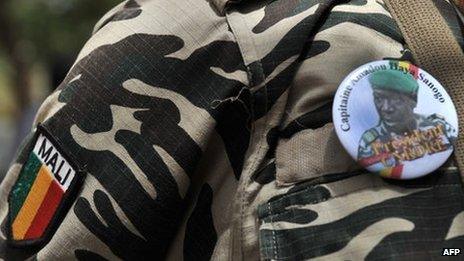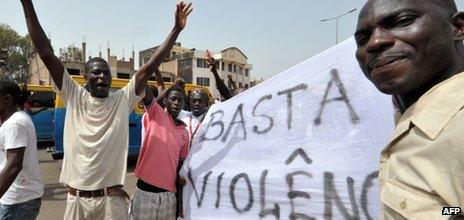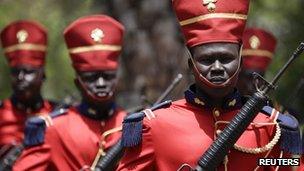African viewpoint: Coups, a West African disease?
- Published
- comments

West Africa tends not to wear a coup as a badge of pride these days
In our series of viewpoints from African journalists, Ghanaian writer Elizabeth Ohene looks back at the changing history of West Africa's military putsches.
Coups d'etat have been on my mind these past few weeks.
It started, of course, with Captain Amadou Haya Sanogo and his antics in Mali.
Then, just as I thought we were getting to the end of that one, I woke up to the news last Friday morning that there was a military takeover in progress in Guinea-Bissau.
It is not yet clear how the soldiers' adventure in Bissau will turn out, but what is clear is things have changed or, at least, are changing in my part of Africa.
Barely an hour or so into the news, and out comes a very strong condemnation from Ecowas, the West African regional group.
But even that speedy response has not stopped the entire sub-region being dragged into the mess - with the reference in the news to the "West African" nation of Guinea-Bissau.
I tell you, this fills me with impotent rage.
It is the type of anger you feel when everybody on your street is doing their best to keep the area a bit upmarket and there is this one household with an overgrown garden and uncollected rubbish, to which the police keep getting called.
The whole neighbourhood gets a bad reputation.
Infectious?
We in West Africa used to be notorious for our coups.
Between 1963 - when the first elected president of Togo, Sylvanus Olympio, was overthrown - and the year 2000, there were 27 military takeovers in West Africa. And those are only the successful ones.

No elected president in Guinea-Bissau has completed a term
Senegal, of course, stands out proudly as never having had military meddling in politics.
Even though in recent times Ivory Coast has gained a reputation for instability, it is worth mentioning that it was only on Christmas Eve 1999 - almost 40 years after independence - that Ivorian soldiers first came out of their barracks.
Nevertheless, during this time you would have been forgiven for thinking that coups were an infectious disease endemic in West Africa.
Nigeria and Ghana led the way and others followed.
And the reasons each group of soldiers gave for their topplings sounded eerily similar: A government had to be overthrown because economic conditions were intolerable, and ministers were growing fat on greed and corruption.
And there was an echo in the names given to the bodies they formed to rule their countries: A "national liberation", "redemption", "salvation" or "revolutionary" council.
And as daylight follows night, they all turn out to be more corrupt than the people they overthrow; the economic conditions worsen and the human rights situation worsens.
Answering back
It took a while but we in West Africa learnt the very hard way that, given the opportunity, uniformed men are certainly more cruel and just as corrupt as their civilian compatriots.
The surprising thing was how easily the coups were accepted:

Soldiers in Senegal are the only ones in West African never to have seized power
A group of soldiers seizes the studios of the state (and only) broadcaster and make their announcement about having come to save us
The entire population falls into line and members of parliament and ministers of state give themselves up to be locked up in police stations and prisons for months and even years.
This, in a region that prides itself on being the most politically astute on the continent - and where the people always answer back.
When Ecowas was formed in 1975, the majority of its members states had military heads of state - and a new coup leader was therefore warmly welcomed at meetings, without anybody batting an eyelid.
I recollect only one occasion when a coup-maker was told he was not welcome.
That was when Nigeria's then-President Shehu Shagari would not tolerate the presence at an Ecowas meeting in Togo's capital, Lome, of Liberia's Master Sergeant Samuel Kanyon Doe - who had arrived with the blood of his putsch fresh on his hands.
Mosquitoes to blame?
I have tried - without success - to work out why the region provided such fertile ground for coups.
I wondered if the mosquito and malaria had anything to do with it.
Remember, this part of Africa was supposed to have been the white man's grave - and it certainly saved us from a certain type of colonial experience.
Or maybe it is because we are better at football - and hopeless at long-distance running.
Whatever the reason, I am convinced things have changed.
Ecowas now issues a statement condemning a coup even before the troop movements have settled.
As Captain Sanogo in Mali has learnt, this neighbourhood has developed zero tolerance for coups.
The chaps in Bissau will also learn, eventually.
<bold>If you would like to comment on Elizabeth Ohene's column, please do so below.</bold>